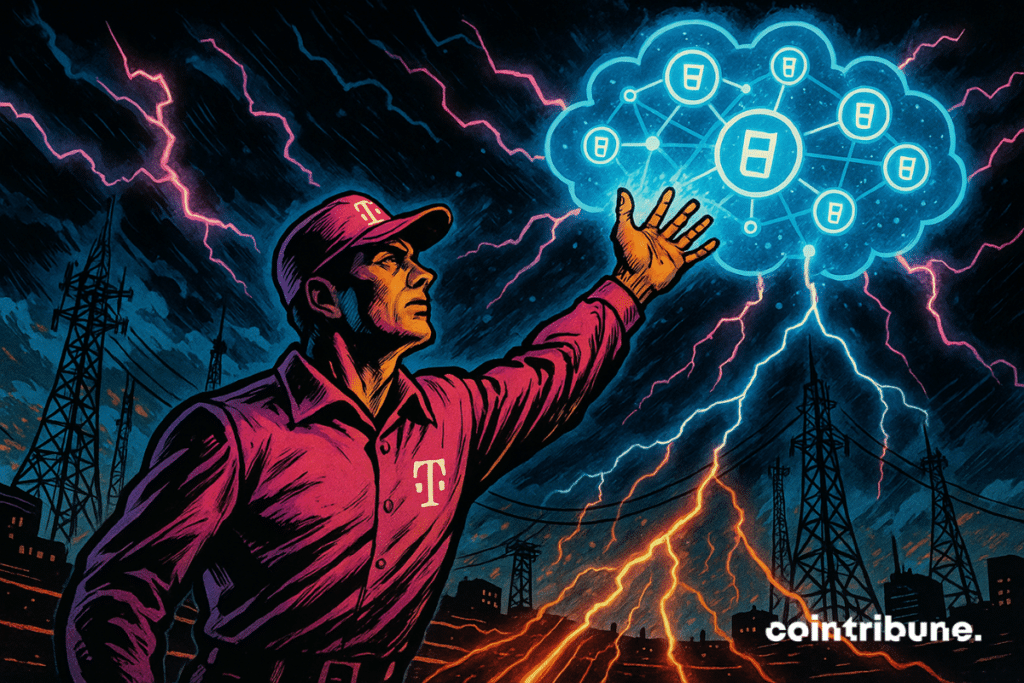Deutsche Telekom Expands Into Decentralized Cloud With Theta Network
Germany’s Deutsche Telekom has joined Theta Network as an enterprise validator, marking a major expansion of its involvement in blockchain and decentralized computing. By taking on this role, the telecom leader becomes part of Theta’s growing group of corporate validators.

In brief
- Deutsche Telekom becomes the first telecom to validate transactions on Theta’s Layer 1 blockchain network.
- The company will stake THETA tokens and earn TFUEL rewards while helping secure Theta’s decentralized ecosystem.
- Theta EdgeCloud links edge nodes with cloud providers for efficient, GPU-driven decentralized computing.
- Partnership strengthens Deutsche Telekom’s Web3 strategy and expands its role in blockchain-based digital infrastructure.
Partnership Marks a Key Step in Merging Blockchain With Traditional Telecom
Theta Network announced the partnership, noting that Deutsche Telekom is the first telecommunications company to serve as a validator on its blockchain. As part of this role, the company will verify transactions and help secure the Layer 1 network through a public validator address. The move marks a significant milestone for both Theta’s enterprise ecosystem and Deutsche Telekom’s involvement with blockchain technology.
As a validator, Deutsche Telekom will stake Theta’s native THETA token and, in return, receive staking rewards in TFUEL—the operational token that powers transactions and payments within the Theta ecosystem. TFUEL also drives Theta EdgeCloud, the network’s decentralized hybrid cloud platform designed to provide distributed GPU computing power.
Theta EdgeCloud connects community-run edge nodes with professional cloud providers to supply computing resources more efficiently. By distributing workloads to edge nodes, it helps reduce latency and operating costs compared to traditional centralized systems. The platform supports applications such as 3D modeling, real-time data processing, and large-scale machine learning.
Deutsche Telekom’s participation reinforces Theta’s work in decentralized cloud computing, especially as demand increases for scalable, high-performance infrastructure. According to the company, joining Theta Network is a natural extension of its digital infrastructure strategy into blockchain-based environments.
Academic Use Cases Showcase Theta’s Technical Capabilities
Dirk Roeder, Head of Telekom MMS Web3 Infrastructure and Solutions, said the decision was influenced by Theta’s performance in demanding computing environments. He noted that Deutsche Telekom was drawn to Theta EdgeCloud’s strong performance and security record.
The Telekom chief pointed to academic settings where large AI models are developed and deployed at the edge. Theta’s decentralized structure, he added, aligns with Deutsche Telekom’s focus on secure and reliable digital infrastructure.
We’ve been impressed by recent Theta EdgeCloud use cases focused on reliability, performance, and security, particularly in academia, where large AI models are trained and served at the edge. Theta’s decentralized architecture aligns with our focus on dependable, secure infrastructure.
Dirk Roeder
Roeder explained that the collaboration supports Deutsche Telekom’s broader digital strategy, which aims to explore emerging technologies and open up new growth opportunities.
Theta Network CEO and co-founder Mitch Liu welcomed Deutsche Telekom’s involvement, describing it as a major step for decentralized cloud services serving media and computing industries. Liu emphasized that Deutsche Telekom’s long-standing experience with blockchain positions it as a key contributor to Theta’s validator network.
Theta Network Positions Itself at the Center of Decentralized Cloud Growth
At the core of this partnership is the Theta EdgeCloud—a system designed to improve computing efficiency and accessibility for developers and enterprises. Its architecture delivers several key advantages:
- Hybrid structure: Combines community edge nodes with cloud partners for greater flexibility and balanced resource distribution.
- Decentralized computing: Reduces reliance on centralized data centers, improving scalability and lowering costs.
- Performance-oriented design: Provides GPU-based processing for applications that require fast rendering and analytics.
- Cost efficiency: Uses idle computing resources to deliver affordable cloud capacity.
- Wide integration: Supports academic, industrial, and media-based projects, enabling access to high-performance computing.
Through these features, Theta EdgeCloud offers a flexible foundation for real-time, data-intensive tasks. Its network already supports partners such as the Houston Rockets and research institutions at Stanford University, Seoul National University, and Singapore’s NTU.
Deutsche Telekom’s participation is expected to expand Theta’s presence in enterprise computing markets, particularly those focused on AI-related workloads.
Deutsche Telekom’s involvement with Theta Network adds to its growing Web3 portfolio, managed by its subsidiary Deutsche Telekom MMS. In recent years, the telecom provider has operated infrastructure and validator services for Ethereum, Chainlink, and Polkadot—reflecting steady progress in blockchain integration.
Last year, Deutsche Telekom also collaborated with Bankhaus Metzler on a pilot Bitcoin mining project powered by surplus renewable energy. Conducted at Rival GmbH Engineering in Backnang, the initiative used excess energy that would have otherwise gone unused due to grid limitations.
Maximize your Cointribune experience with our "Read to Earn" program! For every article you read, earn points and access exclusive rewards. Sign up now and start earning benefits.

James Godstime is a crypto journalist and market analyst with over three years of experience in crypto, Web3, and finance. He simplifies complex and technical ideas to engage readers. Outside of work, he enjoys football and tennis, which he follows passionately.
The views, thoughts, and opinions expressed in this article belong solely to the author, and should not be taken as investment advice. Do your own research before taking any investment decisions.